
When Nancy’s landlord demanded she and her three daughters vacate their rental home for a week, she thought life couldn’t get worse. But a surprise meeting with the landlord’s brother revealed a shocking betrayal.
Our house isn’t much, but it’s ours. The floors creak with every step, and the paint in the kitchen is peeling so badly that I’ve started calling it “abstract art.”

An old house | Source: Pexels
Still, it’s home. My daughters, Lily, Emma, and Sophie, make it feel that way, with their laughter and the little things they do that remind me why I push so hard.
Money was always on my mind. My job as a waitress barely covered our rent and bills. There was no cushion, no backup plan. If something went wrong, I didn’t know what we’d do.
The phone rang the next day while I was hanging out laundry to dry.

A woman hanging laundry | Source: Pexels
“Hello?” I answered, tucking the phone between my ear and shoulder.
“Nancy, it’s Peterson.”
His voice made my stomach tighten. “Oh, hi, Mr. Peterson. Is everything okay?”
“I need you out of the house for a week,” he said, as casually as if he were asking me to water his plants.

A woman talking on her phone | Source: Pexels
“What?” I froze, a pair of Sophie’s socks still in my hands.
“My brother’s coming to town, and he needs a place to stay. I told him he could use your house.”
I thought I must’ve misheard him. “Wait—this is my home. We have a lease!”
“Don’t start with that lease nonsense,” he snapped. “Remember when you were late on rent last month? I could’ve kicked you out then, but I didn’t. You owe me.”

An angry man talking on his phone | Source: Freepik
I gripped the phone tighter. “I was late by one day,” I said, my voice shaking. “My daughter was sick. I explained that to you—”
“Doesn’t matter,” he interrupted. “You’ve got till Friday to get out. Be gone, or maybe you won’t come back at all.”
“Mr. Peterson, please,” I said, trying to keep the desperation out of my voice. “I don’t have anywhere else to go.”

An expressive woman talking | Source: Pexels
“Not my problem,” he said coldly, and then the line went dead.
I sat on the couch, staring at the phone in my hand. My heart pounded in my ears, and I felt like I couldn’t breathe.
“Mama, what’s wrong?” Lily, my oldest, asked from the doorway, her eyes filled with concern.
I forced a smile. “Nothing, sweetheart. Go play with your sisters.”
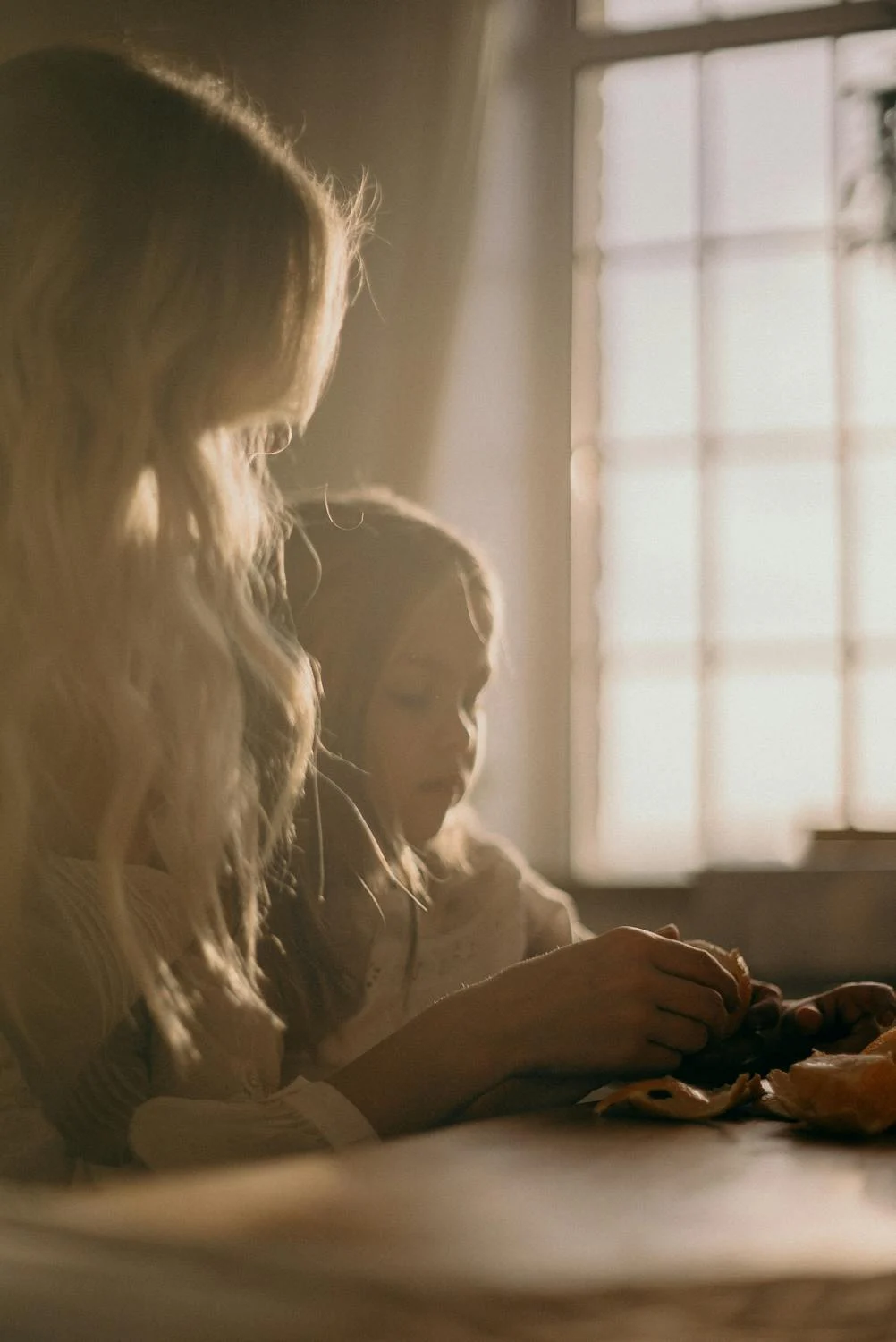
A woman talking to her daughter | Source: Pexels
But it wasn’t nothing. I had no savings, no family nearby, and no way to fight back. If I stood up to Peterson, he’d find an excuse to evict us for good.
By Thursday night, I’d packed what little we could carry into a few bags. The girls were full of questions, but I didn’t know how to explain what was happening.
“We’re going on an adventure,” I told them, trying to sound cheerful.

A woman packing together with her daughter | Source: Pexels
“Is it far?” Sophie asked, clutching Mr. Floppy to her chest.
“Not too far,” I said, avoiding her gaze.
The hostel was worse than I expected. The room was tiny, barely big enough for the four of us, and the walls were so thin we could hear every cough, every creak, every loud voice from the other side.

A woman in a hostel | Source: Freepik
“Mama, it’s noisy,” Emma said, pressing her hands over her ears.
“I know, sweetie,” I said softly, stroking her hair.
Lily tried to distract her sisters by playing I Spy, but it didn’t work for long. Sophie’s little face crumpled, and tears started streaming down her cheeks.
“Where’s Mr. Floppy?” she cried, her voice breaking.
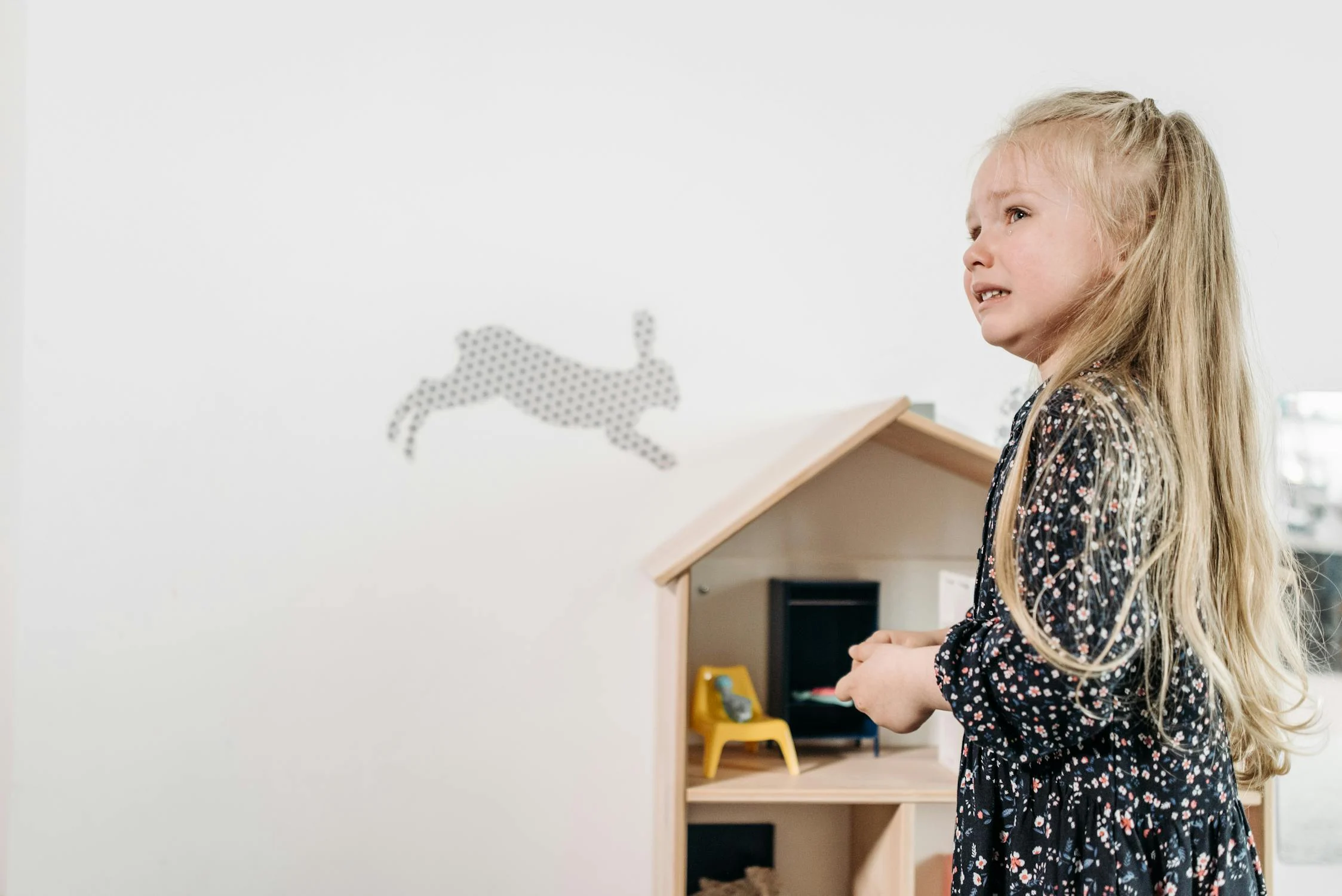
A crying child | Source: Pexels
My stomach sank. In the rush to leave, I’d forgotten her bunny.
“He’s still at home,” I said, my throat tightening.
“I can’t sleep without him!” Sophie sobbed, clutching my arm.
I wrapped her in my arms and held her close, whispering that it would be okay. But I knew it wasn’t okay.

A woman hugging her crying child | Source: Freepik
That night, as Sophie cried herself to sleep, I stared at the cracked ceiling, feeling completely helpless.
By the fourth night, Sophie’s crying hadn’t stopped. Every sob felt like a knife to my heart.
“Please, Mama,” she whispered, her voice raw. “I want Mr. Floppy.”
I held her tightly, rocking her back and forth.
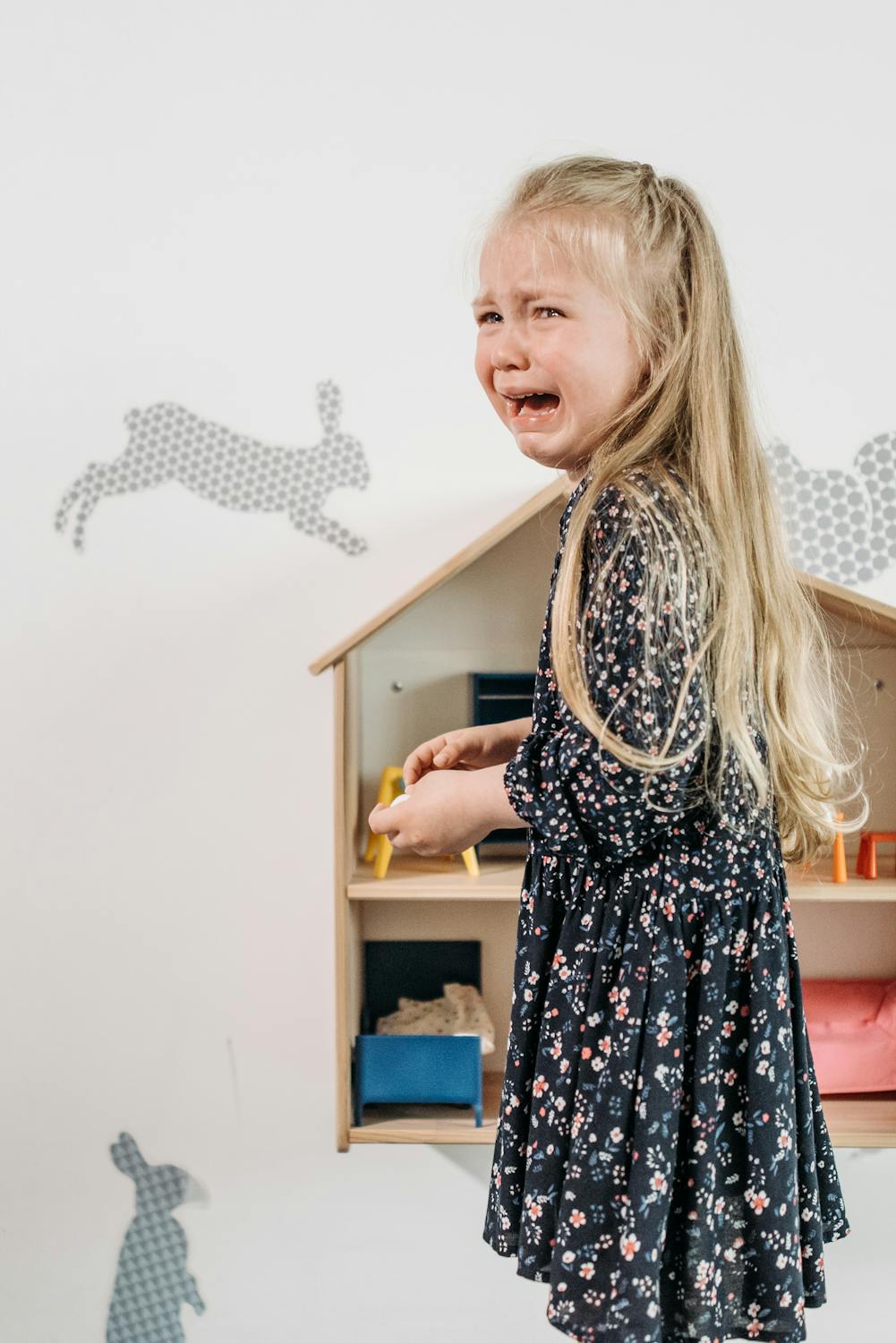
A crying girl | Source: Pexels
I couldn’t take it anymore.
“I’ll get him,” I whispered, more to myself than to her.
I didn’t know how, but I had to try.
I parked down the street, my heart pounding as I stared at the house. What if they didn’t let me in? What if Mr. Peterson was there? But Sophie’s tear-streaked face wouldn’t leave my mind.

A thoughtful woman in front of her house | Source: Midjourney
I took a deep breath and walked up to the door, Sophie’s desperate “please” echoing in my ears. My knuckles rapped against the wood, and I held my breath.
The door opened, and a man I’d never seen before stood there. He was tall, with a kind face and sharp green eyes.
“Can I help you?” he asked, looking puzzled.

A man in front of his house | Source: Midjourney
“Hi,” I stammered. “I—I’m sorry to bother you, but I’m the tenant here. My daughter left her stuffed bunny inside, and I was hoping I could grab it.”
He blinked at me. “Wait. You live here?”
“Yes,” I said, feeling a lump form in my throat. “But Mr. Peterson told us we had to leave for a week because you were staying here.”

A sad woman in the doorway | Source: Pexels
His brows furrowed. “What? My brother said the place was empty and ready for me to move in for a bit.”
I couldn’t stop the words from spilling out. “It’s not empty. This is my home. My kids and I are crammed into a hostel across town. My youngest can’t sleep because she doesn’t have her bunny.”

A sad young woman talking to a man | Source: Midjourney
His face darkened, and for a second, I thought he was angry at me. Instead, he muttered, “That son of a…” He stopped himself, closing his eyes and taking a deep breath.
“I’m so sorry,” he said, his voice softer now. “I had no idea. Come in, and we’ll find the bunny.”

A serious young man opening his door | Source: Midjourney
He stepped aside, and I hesitated before walking in. The familiar smell of home hit me, and my eyes burned with tears I refused to let fall. Jack—he introduced himself as Jack—helped me search Sophie’s room, which looked untouched.
“Here he is,” Jack said, pulling Mr. Floppy from under the bed.
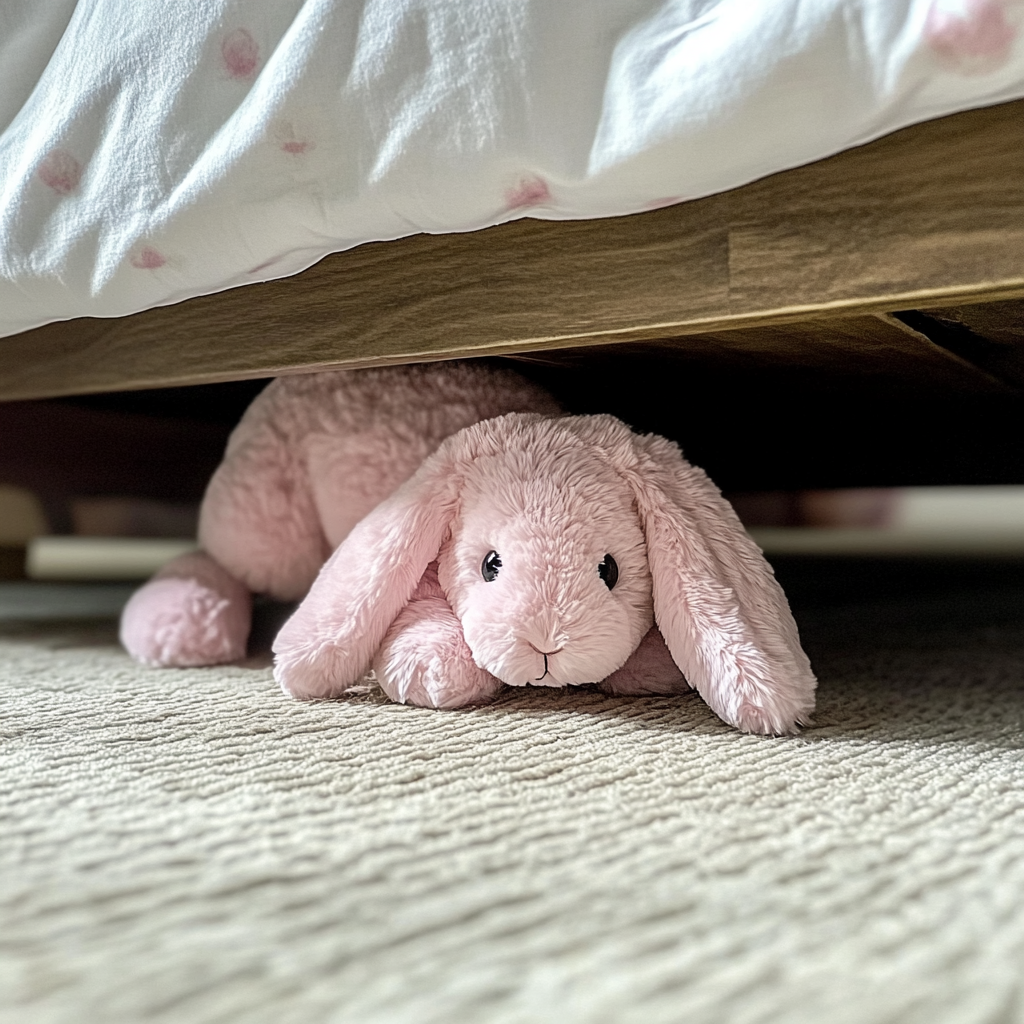
A pink stuffed bunny under a bed | Source: Midjourney
I held the bunny close, imagining Sophie’s joy. “Thank you,” I said, my voice trembling.
“Tell me everything,” Jack said, sitting on the edge of Sophie’s bed. “What exactly did my brother say to you?”
I hesitated but told him everything: the call, the threats, the hostel. He listened quietly, his jaw tightening with every word.

A couple talking | Source: Midjourney
When I finished, he stood and pulled out his phone. “This isn’t right,” he said.
“Wait—what are you doing?”
“Fixing this,” he said, dialing.
The conversation that followed was heated, though I could only hear his side.

A serious man on his phone | Source: Pexels
“You kicked a single mom and her kids out of their home? For me?” Jack’s voice was sharp. “No, you’re not getting away with this. Fix it now, or I will.”
He hung up and turned to me. “Pack your things at the hostel. You’re coming back tonight.”
I blinked, not sure I’d heard him right. “What about you?”
“I’ll find somewhere else to stay,” he said firmly. “I can’t stay here after what my brother pulled. And he’ll cover your rent for the next six months.”

A smiling man talking to a woman | Source: Midjourney
That evening, Jack helped us move back in. Sophie lit up when she saw Mr. Floppy, her little arms clutching the bunny like a treasure.
“Thank you,” I told Jack as we unpacked. “You didn’t have to do all this.”
“I couldn’t let you stay there another night,” he said simply.
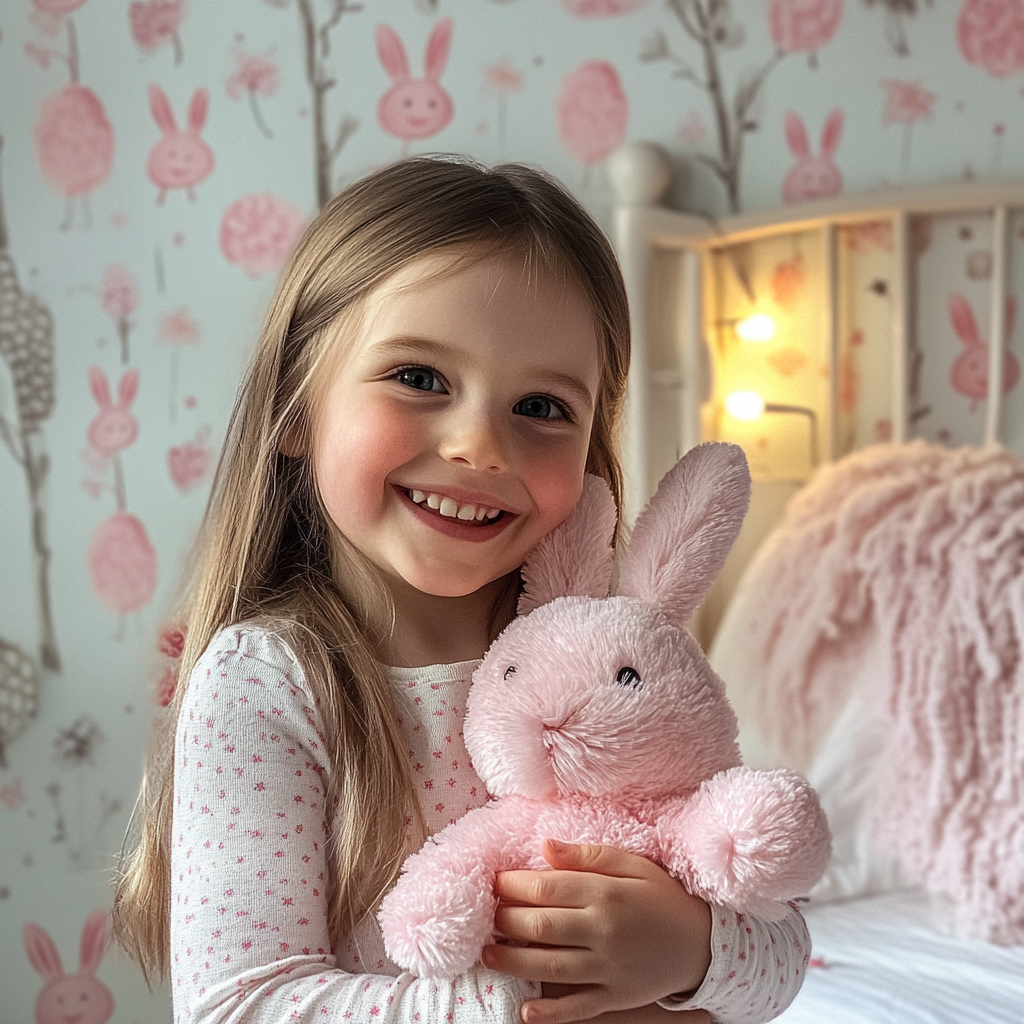
A young child holding her toy | Source: Midjourney
Over the next few weeks, Jack kept showing up. He fixed the leaky faucet in the kitchen. One night, he brought over groceries.
“You didn’t have to do this,” I said, feeling overwhelmed.
“It’s nothing,” he said with a shrug. “I like helping.”

A man with groceries | Source: Pexels
The girls adored him. Lily asked for his advice on her science project. Emma roped him into board games. Even Sophie warmed up to him, offering Mr. Floppy a “hug” for Jack to join their tea party.
I started to see more of the man behind the kind gestures. He was funny, patient, and genuinely cared about my kids. Eventually, our dinners together blossomed into a romance.

A couple on a date night | Source: Pexels
One evening several months later, as we sat on the porch after the girls had gone to bed, Jack spoke quietly.
“I’ve been thinking,” he said, looking out into the yard.
“About what?”
“I don’t want you and the girls to ever feel like this again. No one should be scared of losing their home overnight.”

A young man talking to his girlfriend | Source: Midjourney
His words hung in the air.
“I want to help you find something permanent,” he continued. “Will you marry me?”
I was stunned. “Jack… I don’t know what to say. Yes!”

A marriage proposal | Source: Pexels
A month later, we moved into a beautiful little house Jack found for us. Lily had her own room. Emma painted hers pink. Sophie ran to hers, holding Mr. Floppy like a shield.
As I tucked Sophie in that night, she whispered, “Mama, I love our new home.”
“So do I, baby,” I said, kissing her forehead.

A woman tucking her daughter in | Source: Midjourney
Jack stayed for dinner that night, helping me set the table. As the girls chattered, I looked at him and knew: he wasn’t just our hero. He was family.
This work is inspired by real events and people, but it has been fictionalized for creative purposes. Names, characters, and details have been changed to protect privacy and enhance the narrative. Any resemblance to actual persons, living or dead, or actual events is purely coincidental and not intended by the author.
The author and publisher make no claims to the accuracy of events or the portrayal of characters and are not liable for any misinterpretation. This story is provided “as is,” and any opinions expressed are those of the characters and do not reflect the views of the author or publisher.
My Husband Didn’t Save Me Any Food for Dinner While I Was Feeding Our Newborn Son
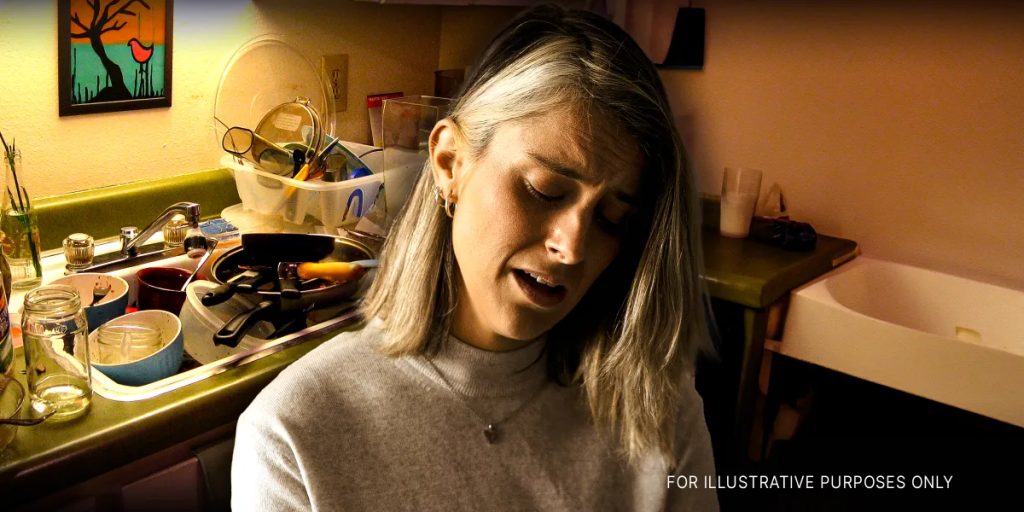
Five weeks ago, my world changed in the most beautiful and challenging ways when I became a mother. My son, with his tiny fingers and soft sighs, became the center of my universe. Yet, amid this new and overwhelming love, a shadow loomed over our little family’s happiness — my mother-in-law.
From the moment we brought our son home, she stationed herself in our living room, transforming it into her base camp. Her intentions might have been good, at least that’s what my husband believed, asserting she was here to help us navigate through these early days of parenthood. However, her presence quickly became another source of stress. She filled our home with visitors, contributing to the chaos rather than alleviating it. Despite this, I bit my tongue, choosing silence over confrontation, all for the sake of peace.

A mam and her baby | Source: Pexels
Amidst the endless cycle of feeding, changing diapers, and soothing my son to sleep, I found little time for myself, often going hours without food. My mother-in-law, claiming that she was there to cook, didn’t extend her support to actually helping with the baby. Eventually, I was exhausted and hungry, clinging to the hope that at least I wouldn’t have to worry about meals.

A woman cooking | Source: Pexels
Last night shattered that last vestige of appreciation I had for her so-called help. After a long evening spent breastfeeding, I emerged from the nursery, expecting to find a plate saved for me, only to be met with indifference from my husband and outright disregard from his mother.
The coldness in her voice as she informed me there was no food left because she assumed I wasn’t hungry cut deeper than any physical hunger I felt. In that moment, my frustration boiled over. The argument that ensued was heated and bitter, revealing the deep fissures in our family dynamics.

An empty plate | Source: Pexels
My husband’s defense of his mother, coupled with his outrage at my reaction, made it painfully clear that I was alone in this struggle. On top of it all, he even expected me to wash the dishes as well. Feeling utterly unsupported and unseen, I made the decision to leave, seeking refuge in my mother’s home. The calm and care I found there stood in stark contrast to the turmoil I left behind.

An upset woman | Source: Pexels
Yet, even here, where I thought I would be safe, the conflict followed. My husband’s relentless calls and messages, each more accusatory than the last, painted me as the villain in this scenario. His inability to understand my perspective, to see the toll his mother’s presence and his lack of support took on me, was disheartening. The narrative he spun to his family, that I was keeping our son from him over a trivial matter like food, only added to my sense of isolation.

An angry guy | Source: Pexels
As I tried to navigate through these swirling emotions, the bond with my son remained my anchor. His innocent dependence on me, his warmth, and his trust, fortified my resolve to seek a better environment for us both, even if it meant standing against the expectations and demands of my husband and his family.
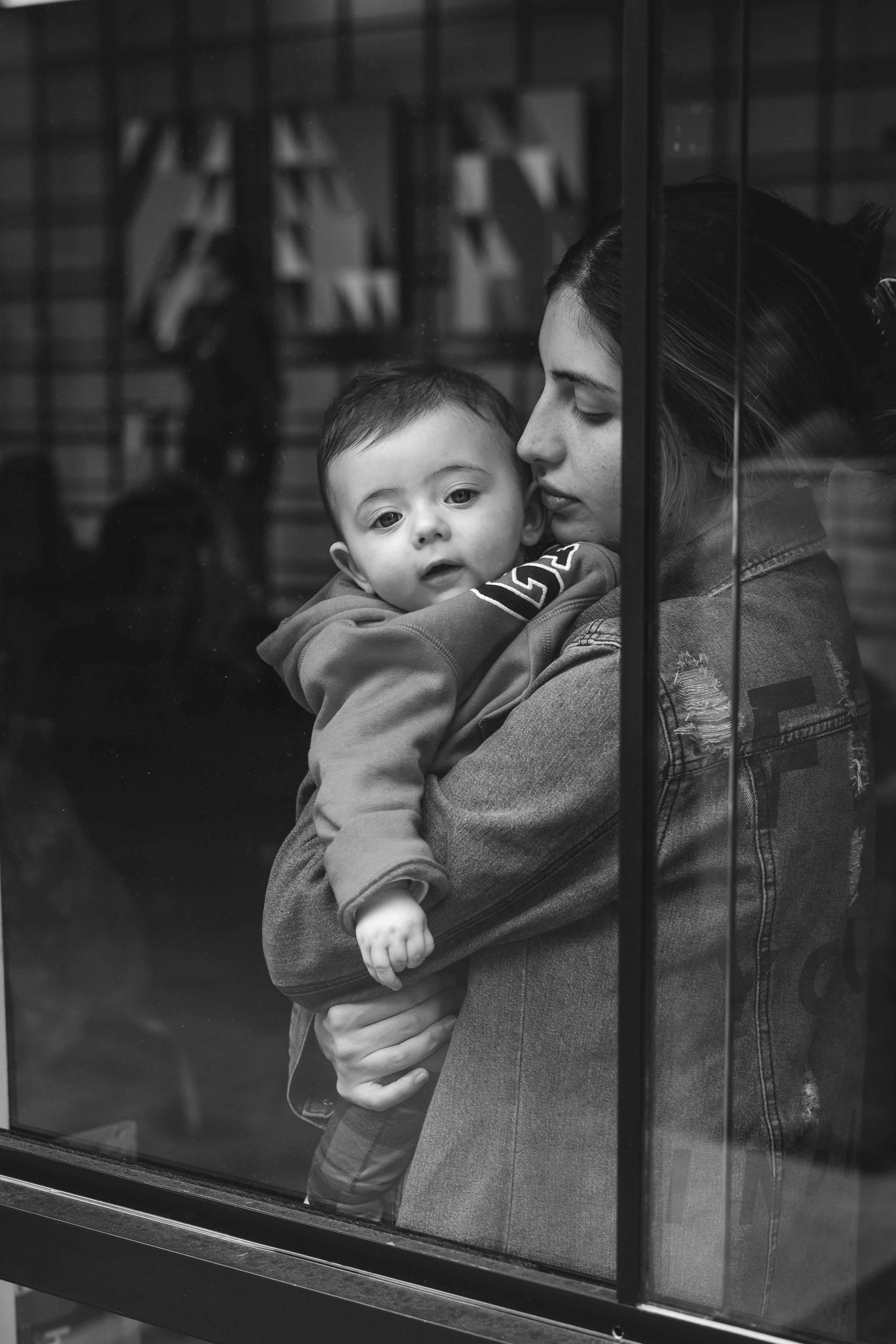
A woman and her baby | Source: Pexels
In the quiet of my mother’s house, with my son cradled close, I pondered our future. The path forward seemed daunting, fraught with difficult conversations and decisions. Yet, in the face of this adversity, I knew I had to advocate for myself and my son, to strive for a life filled with the love, respect, and support we deserved.

A woman enjoying a cup of coffee | Source: Pexels
In a moment of sheer desperation, I reached out to the one person I hadn’t considered before — my father-in-law. Through tear-blurred eyes and with a trembling voice, I poured out my heart, detailing every strain and stress that had pushed me to my limit. To my surprise, he didn’t just offer words of comfort; he took immediate action.

A man on a phone call | Source: Pexels
Within the hour, we were standing together at my house’s doorstep, his usually gentle demeanor replaced with a stern resolve that I had rarely seen. He didn’t spare a moment for pleasantries, bypassing me to confront the heart of the turmoil — his son and wife, seated obliviously in front of the TV. The air grew heavy with anticipation as he declared, “This ends now,” a simple yet powerful decree that commanded attention.
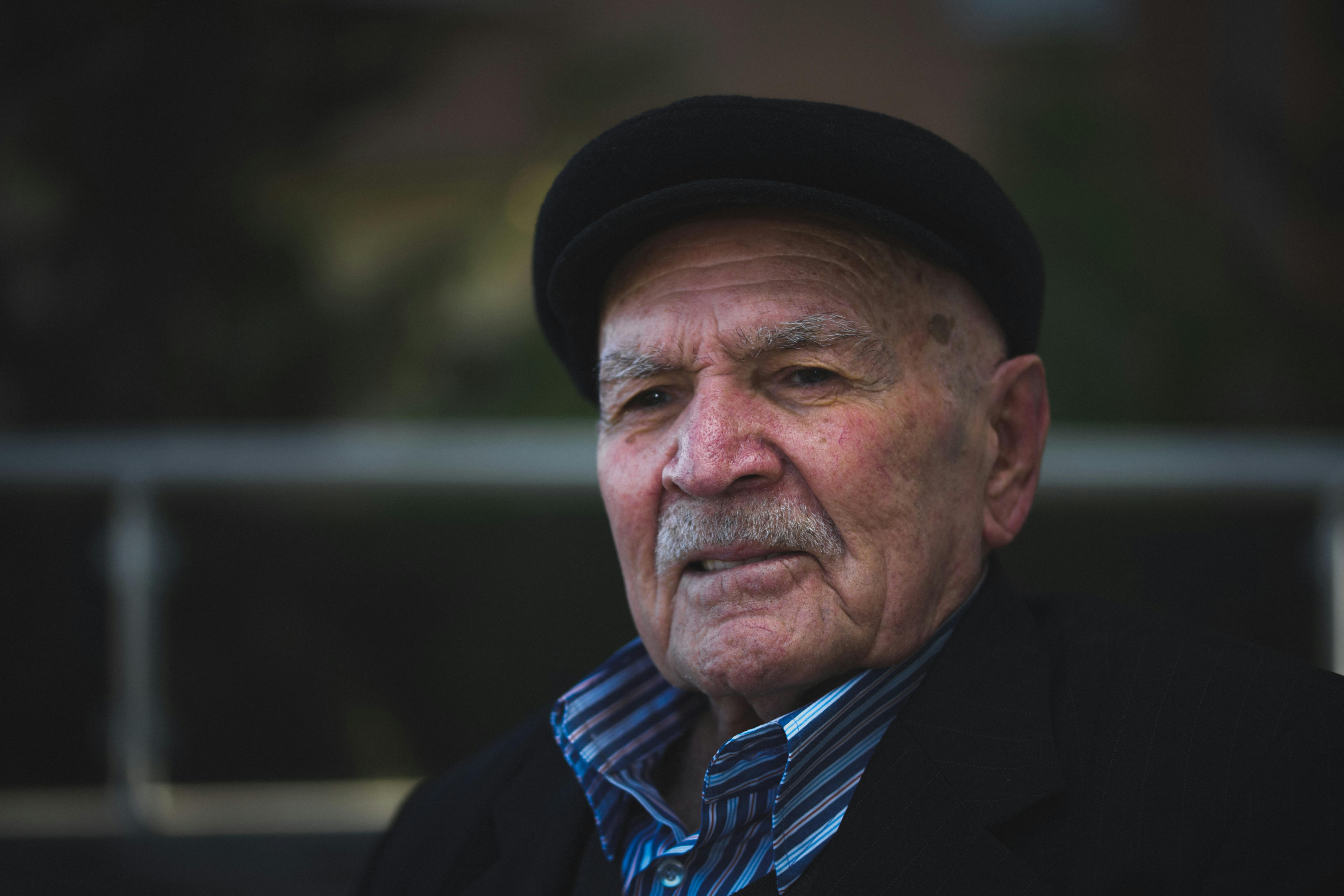
An older man | Source: Pexels
He turned to my husband first, his voice a mix of disappointment and authority, “You will wash the dishes every night from now on. Your wife needs your support, not your neglect.” The shock on my husband’s face was palpable, a visible sign that the weight of his father’s words had struck a chord.
Then, without missing a beat, he addressed his wife, my mother-in-law, with a clarity and firmness that left no room for negotiation. “And you, it’s time to go home. Your ‘help’ here is doing more harm than good.” The impact of his words on her was immediate; the usually unflappable woman was reduced to a silent, stunned figure, her protests dying before they could even begin.
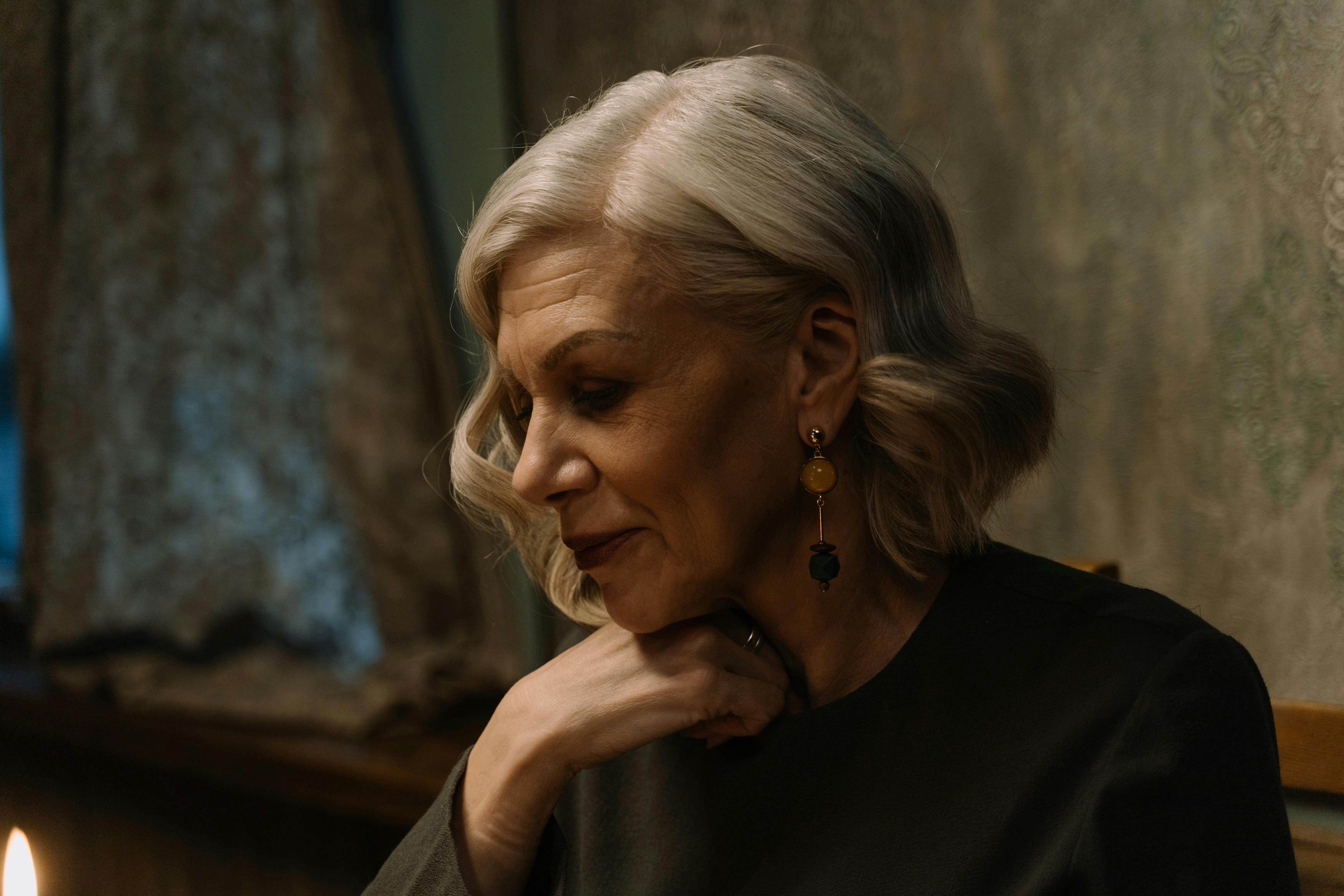
An upset older woman | Source: Pexels
With the air still echoing his pronouncements, my father-in-law turned to me, a softness returning to his gaze, “Now, let’s go get you a proper meal.” That dinner was a welcome pause in the storm where understanding and compassion filled the gaps worn by weeks of tension. It was a balm to my frayed nerves, a gesture of solidarity that I had sorely missed.

Woman enjoying a meal | Source: Pexels
Back home, the reality of my father-in-law’s intervention began to take root. My husband, confronted with the undeniable truth of his neglect, took to the dishes — a symbolic act of taking responsibility not just for the cleanliness of our home, but for the well-being of our family. It was a turning point, one that reshaped the dynamics of our household.

A happy woman | Source: Pexels
The changes were gradual but undeniable. My husband emerged as a more present and supportive partner, actively participating in the care of our son and the myriad tasks that keep a home running smoothly. My mother-in-law’s presence in our home, once a source of constant stress, became a rare and much more welcome occurrence. Her visits, now infrequent, were no longer invasions but genuine attempts to connect and contribute positively to our family life.

A happy family | Source: Pexels
This transformation, sparked by the bold yet necessary intervention of my father-in-law, brought about a sense of peace and respect that had been missing. The support I had longed for was finally manifesting, not just in the physical help around the house but in the emotional solidarity that now characterized our family. It was a stark reminder of the power of understanding and the profound impact of taking a stand for what’s right.
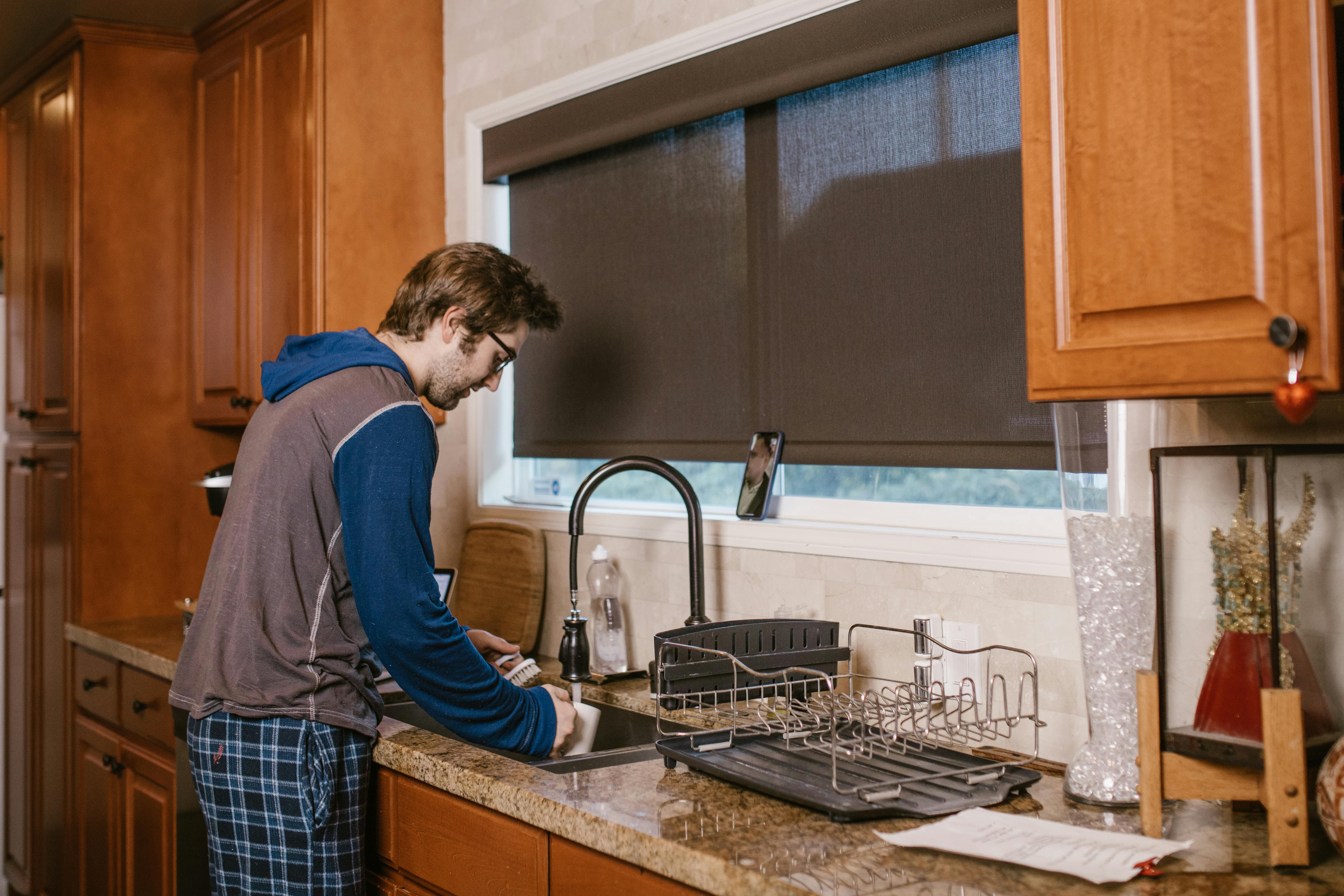
A man washing dishes | Source: Pexels
In the end, the turmoil that had once seemed insurmountable became the catalyst for a deeper connection and appreciation among us all. My husband’s efforts to amend his ways and my mother-in-law’s adjusted approach to her visits painted a hopeful picture of our future — a future where support, respect, and love were no longer scarce commodities but the foundation of our home.
How would you have dealt with this situation? Let us know on Facebook.
Here’s a similar story about a MIL who threw her DIL’s food out.
My MIL Threw Away All My Food from the Fridge – I Responded on Her Birthday
Living under the same roof with my mother-in-law had always been a test of patience, especially given the cultural chasm that lay between us. But I never anticipated that her disdain for my South Asian heritage would escalate to the point of her disposing of all my cooking supplies, a deliberate act that felt like a direct assault on my identity.

Kebabs roasting | Source: Pexels
My culinary practices, deeply rooted in my culture, were more than just about sustenance; they were a vibrant thread connecting me to my family, my heritage, and my very sense of self. The food I prepared was a celebration of my lineage, each dish a story of my ancestors, flavored with tradition and memories. So, when I discovered my pantry emptied, it was as if those connections had been callously severed.
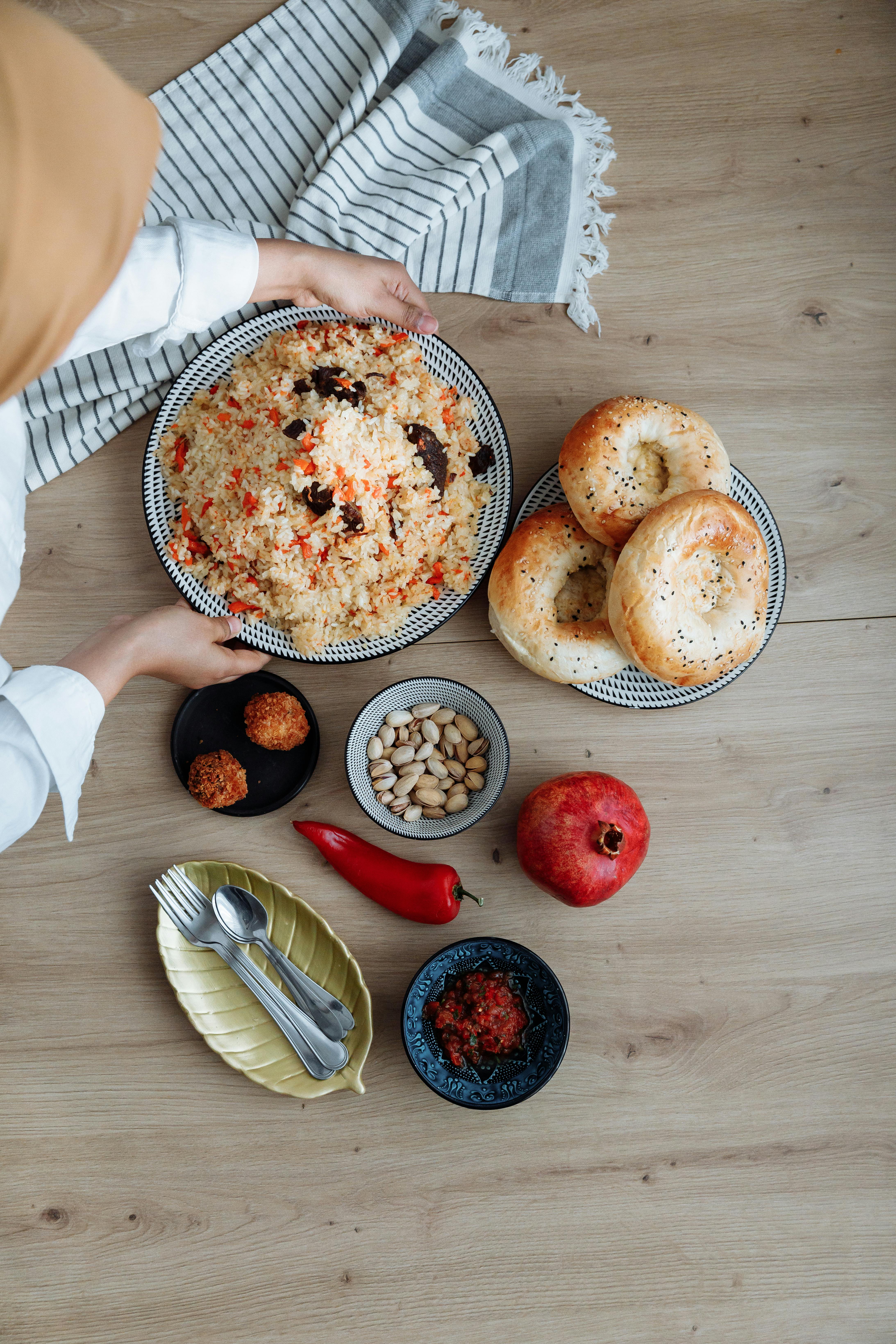
A rice dish with various furnishings | Source: Pexels
This incident was the peak of ongoing tensions. Since my mother-in-law moved in, there had been a noticeable shift in our household dynamics. My husband, caught between his love for the diverse flavors of my cooking and his mother’s criticisms, found himself in an unenviable position of mediator. Despite his best efforts, the harmony we once enjoyed had eroded, leaving in its place a palpable strain that threatened to unravel the fabric of our family.

Various spices | Source: Pexels
Her criticisms weren’t new to me. From my eating habits to the aromatic spices that perfumed our home, she spared no opportunity to express her disdain, her comments a constant echo of disapproval. My husband’s attempts to bridge this gap, to explain the richness and beauty of my culture, often fell on deaf ears, his words dissolving into the air, leaving no impact.

Jards in a pantry | Source: Pexels
The day the pantry stood bare, my world tilted. The realization that she had acted on her contempt by discarding not just the ingredients but a piece of my identity was a profound shock. Her justification, that it was for the sake of her son’s dietary preferences, was a blatant dismissal of my existence, my culture, and the choices of her own son.

A woman doing grocery shopping | Source: Pexels
Faced with the daunting task of replenishing my supplies amid the challenges posed by the quarantine, I returned home from an unsuccessful attempt at grocery shopping, only to be met with her audacious questioning about dinner. It was a moment of clarity for me; I understood then that silence was no longer an option. Her actions were not just a personal attack but a challenge to my place in this family and to my identity. I was determined to not let her narrative define me.

A woman cooking | Source: Pexels
With a newfound resolve, I embarked on a culinary strategy aimed at showcasing my heritage in a manner that was impossible to ignore. My mother-in-law’s upcoming party presented the perfect opportunity. Instead of the traditional American cuisine she had anticipated, I introduced subtle infusions of Indian flavors into each dish, transforming the menu into a silent but powerful statement of my culture.

A dinner party | Source: Pexels
The reaction was immediate and unanimous; the guests were enchanted by the unexpected flavors, their compliments a chorus of approval that filled the room. For the first time, my mother-in-law was forced to witness the embrace of my heritage by her own friends, a reality that challenged her prejudices head-on.

People enjoying a dinner party | Source: Pexels
This breakthrough moment at the party served as a turning point. The praise from her guests prompted a reluctant reevaluation of her biases, leading to a begrudging acknowledgment of her misplaced animosity. The realization that her resistance was rooted in deeper biases and that her son’s happiness was intertwined with the acceptance of his wife’s culture marked the beginning of a shift in our relationship.

People talking and laughing at a table full of food | Source: Pexels
Although the journey towards full acceptance and understanding remained fraught with challenges, the decision for my mother-in-law to move out signaled a new chapter for our family. It was a change that brought with it a breath of fresh air, allowing for healing and the promise of a more harmonious future.

People enjoying a meal | Source: Pexels
The experience, painful as it was, underscored the transformative power of food as a bridge between cultures. It taught us the importance of embracing diversity and the beauty of opening our hearts and homes to the stories and traditions that food can tell, paving the way for acceptance and mutual respect.
This work is inspired by real events and people, but it has been fictionalized for creative purposes. Names, characters, and details have been changed to protect privacy and enhance the narrative. Any resemblance to actual persons, living or dead, or actual events is purely coincidental and not intended by the author.
The author and publisher make no claims to the accuracy of events or the portrayal of characters and are not liable for any misinterpretation. This story is provided “as is,” and any opinions expressed are those of the characters and do not reflect the views of the author or publisher.



Leave a Reply